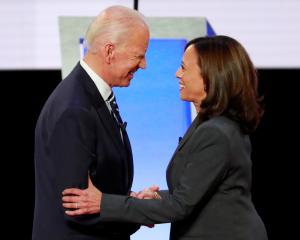
The Dow Jones industrial average plunged more than 1100 points today as stocks took their worst loss in six and a half years.
After US stocks plummeted on Monday (local time), the White House sought to play down concerns, saying President Donald Trump was focused on "exceptionally strong" underlying fundamentals in the economy.
White House spokeswoman Sarah Sanders said the economy was experiencing "strengthening US economic growth, historically low unemployment, and increasing wages for American workers."
But Trump himself did not comment on the market, even as share prices sold off dramatically while he was touting the economy and last year's tax cuts in a speech in Ohio.
That was a contrast to recent months when Trump has often talked about stocks, taking credit for the rally the market enjoyed during 2017 and the first few weeks of this year.
It was a sign that Trump may be absorbing a tough message, underscored by former White House advisers, that American presidents traditionally have avoided commenting directly on Wall Street's fickle trends.

Gene Sperling, a top economic adviser to Democratic former presidents Bill Clinton and Barack Obama, said Trump erred in recent months by focusing so heavily on the stock market.
"Even though the stock market tripled under Bill Clinton, his view was that you should always focus your policies and your public messages on bread-and-butter kitchen table issues ... and that focusing on the stock market would take your eye off the real economy," Sperling said.
White House spokesman Raj Shah, in an adjustment to the administration's message on stocks, told reporters aboard Air Force One en route to Trump's speaking event in Ohio, "Look, markets do fluctuate in the short term. We all know that ... But the fundamentals of this economy are very strong and they're headed in the right direction."
Throughout a speech at a factory in Blue Ash, Ohio, Trump made no mention of stock markets, departing sharply from past practice.
In his State of the Union address last week, Trump said, "The stock market has smashed one record after another, gaining $8 trillion and more in value in just this short period of time."
'TREMENDOUS BENEFITS'
On January 7, he wrote on Twitter, "The Stock Market has been creating tremendous benefits for our country in the form of not only Record Setting Stock Prices, but present and future Jobs, Jobs, Jobs. Seven TRILLION dollars of value created since our big election win!"
Three days before that, he tweeted, "Dow just crashes through 25,000. Congrats! Big cuts in unnecessary regulations continuing." He had sent similar tweets for months.
The Republican president told Reuters in a Jan. 17 interview he has been getting kudos from people grateful for increased 401(k) retirement plan values and he believed the rise would not have happened if his Democratic opponent Hillary Clinton had won the 2016 presidential election.
"If the Democrats won the election, the stock market would have gone down 50% from where it was, and now look at the%age increase. It's a record increase," Trump said.
The benchmark Dow Jones industrial average soared 42% between Election Day 2016, when Trump won the presidency, and its historic peak a week ago above 26,400.
On Monday, the Dow fell to below 24,000 but regained some of its midday losses to close at 24,345. In the past five trading days, the index has erased all its gains since late November.
The benchmark S&P 500 has pulled back more than 6% from a Jan. 26 record high.
The "Trump rally," as some traders have dubbed it, has coincided with a sweeping tax code overhaul approved in December, which slashed corporate taxes, and a deregulation push.
The S&P 500 rose 34% from Trump's election to its recent high.
But stock prices have been climbing since March 2009, when Obama inherited a serious financial crisis and the worst economic recession since the Great Depression of the 1930s from the previous Republican administration of George W. Bush. At that time, the Dow was trading at around 6,500.
Trump has also criticized his predecessor Obama's effect on markets. In November 2012, Trump tweeted, "The stock market and US dollar are both plunging today. Welcome to @BarackObama's second term."
The S&P 500 rose 126% from Obama's 2008 election to his final day in office in 2017.
Former Obama press secretary Jay Carney on Monday tweeted, "Good time to recall that in the previous administration, we NEVER boasted about the stock market -- even though the Dow more than doubled on Obama's watch -- because we knew two things: 1) the stock market is not the economy; and 2) if you claim the rise, you own the fall."
Doug Holtz-Eakin, president of the American Action Forum and a former economic adviser to 2008 Republican presidential nominee John McCain, said, "The president shouldn't comment about the stock market. Indeed if anyone is going to make major pronouncements about economic data, it should be the Treasury secretary or the agency releasing the data, so if they get it wrong you can get rid of them. You don't want the president owning those things."












